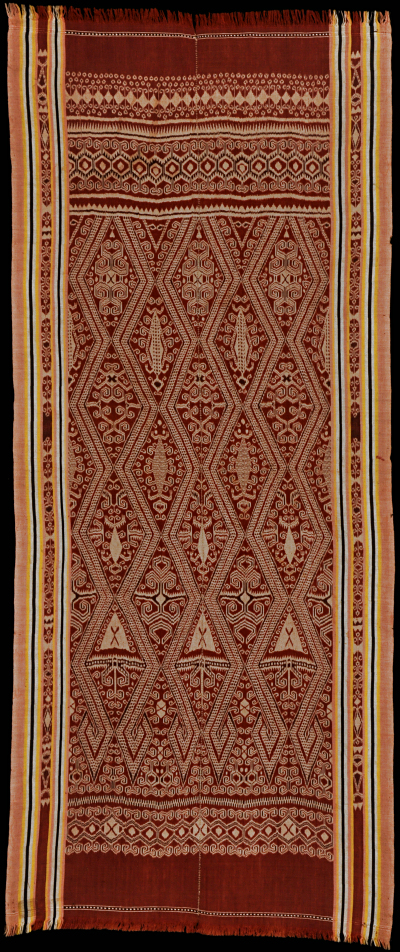| |
 
 | | | |
032 Borneo, Sarawak
Pua kumbu  
| | Locale: | Paku, one of the two main tributaries of the Saribas. | | Period: | 1915-1945 | | Yarn: | Cotton, hand-spun, medium | | Technique: | Warp ikat | | Panels: | 2 | | Size: | 88 x 205 cm (2' 10" x 6' 8") LW: 2.33 | | Design: | Snakes, nabau, enclosing zoomorphic figures in cream on brick red. Borders in white, black, brick red and faded yellow. Possibly the serpent pattern, buah nabau, enriched with zoomorphic shapes, which look like crocodiles, but may well be birds, specifically kites. | | Comment: | Pua kumbu with very fine detailing, tightly woven, with well aligned panels. Border slightly frayed in one spot, small tear in border with old repair. Borders possibly done in toko yarn. Vernon Kedit was so kind as to provide detailed additional information. | | Background: | Chapters on Borneo and Sarawak. | | Exhibited: | Museu do Oriente, Lisbon, 2014/15.
Hong Kong University Museum and Art Gallery, 2017. | | Published: | Woven Languages, 2014.
Ikat Textiles of the Indonesian Archipelago, 2018.
| | Compare: | 033 035 | | Sources: | Very similar to piece in Boston Museum of Fine Arts, No. 30.800. Cf. Khan Majlis, Indonesische Textilien, Wege zu Goettern und Ahnen, Fig. 678. Also Gittinger, Splendid Symbols, Fig. 172. Gavin, The Women's Warpath, Plates 32, 67. Motifs similar to shrew motif in Chaddon c.s. Iban or Sea Dayak Fabrics, Plate VI. Similar overall pattern on pua depicted in Leigh-Heide and Mittersakschmoëller, Lebensmuster, Abb. 187. Also similar to pua in Langewis collection, exhibited in the Tropenmuseum in the early 20th c., shown on photo in the Langewis archive acquired by Thomas Murray.
 | | |

©Peter ten Hoopen, 2025
All rights reserved.
|
|


